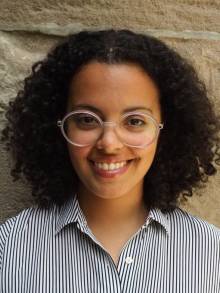Rochelle Brahalla
MPA in Public & Nonprofit Management & Policy
-
2022

What were you doing before you came to NYU Wagner?
After graduating from Cornell University in 2014 with an undergraduate degree in landscape architecture, I worked in urban agriculture in Memphis, TN, for several years, where I built school gardens at public schools. I’d always been curious about how the built environment impacts social processes, social equity, and racial equity. I really enjoyed the work and ultimately moved back to NY to join a small, Black woman-owned landscape architecture firm that focused on racial equity, history, and memory in landscape design. After realizing that planning was a field that I gravitated towards because of the blended environment focusing on human interaction, I found myself at the NYC Department of Transportation (DOT), where I leveraged my skills as a designer, being able to work in computer-aided design (CAD) and understanding spatial design, while plugging into human interactions that inform how spaces are used. As a DOT project manager, I worked on street improvement projects, mostly designing for active transportation modes on NYC streets near schools. I was in the school safety group, where we focused on creating safe connections for students, parents, and anyone traveling to work at a school. We looked at large corridors and small neighborhood streets, and we made improvements for cyclists, pedestrians, and motorists.
Why did you choose NYU Wagner for graduate school?
Shortly before I joined NYU Wagner, I moved into a senior project manager role at NYC Department of Transportation (DOT), where I got exposed to policy in a way that I hadn’t been before. I was compelled by policy and data analysis, and I wanted to focus on urban policy. In my new role at the DOT and as a graduate student at Wagner, I started out thinking more about complex policy challenges as they relate to city infrastructure. In the summer of 2020, when George Floyd was murdered, I moved into an equity policy role and started diving deeper into that work. I explored how to measure equitable impact and how that impact translates into an equitable process of engagement and outreach for transportation projects.
How did your experiences at NYU Wagner prepare you for your career?
What drew me to Wagner was a curiosity for equitable built environments. I stepped into the program with some ideas, then quickly faced information overload, thinking about all these different ways of applying what I learned in the classroom, and ultimately came out on the other end doing equity policy work! The process felt like an accordion of information and tools. Although the journey at that moment felt overwhelming as I was deep-diving into all intricacies of policy making, I came out on the other end doing exactly what I had set out to do in the first place. The tools that I learned at Wagner – like impact evaluation and data analysis – gave me a new language to explain big ideas and to apply that directly to my work at the DOT. As a result, I was able to leverage new-found consensus building skills to develop a robust internal equity framework to apply to our internal team processes.
Can you tell us a bit about your job responsibilities now?
I’m a senior transportation planner at WSP, a global engineering professional services firm with more than 500 offices across 40 countries. In the US, WSP focuses on engineering in the civic infrastructure space. Our urban design teams are rapidly expanding, as is our community and public involvement practice. I’m the equity manager for a congestion pricing project in Portland, OR, where I liaise with the Equity and Mobility Advisory Committee (EMAC) as a key stakeholder. Growing up in the Northeast, I’m familiar with congestion pricing and tolling, but tolling is new to Portland, so I’m working with the EMAC to understand how equity priority communities are perceiving this project, and how to ensure that the planning process and potential outcomes do not disproportionately impact communities of color and low-income communities. My approach addresses engagement, technical analysis, and process equity, ensuring that various equity initiatives are incorporated into the project in meaningful and innovative ways. That also involves equity strategy, which is something that I’m getting to know more about as my work unfolds.
How would you describe your experience as an NYU Wagner student?
I’ve found that there are times when you feel that you’re being more impactful, and there are times where you don’t see the impact much. During the seasons when I felt like I was spinning my wheels at work, being at Wagner was a great outlet where I was learning and growing in ways that would then help me jumpstart my work and find ways to take it to a new level. I got to meet really interesting professors and students, some of whom were on a similar journey as I was, some of whom were a little older and took a large chunk of time between undergraduate and graduate school to really explore, live, and understand exactly what we wanted to focus on in our professions. At that point in my life and career, I also felt that I was able to create more meaningful connections with my professors and fellow students in a way that was different from my undergraduate experience - connections that could move forward. I remember aspiring to be peers with these incredible people, excited to know that I was building a professional cohort while also having mentorship from faculty that helped move me forward in my career and academic interests.